🇫🇷 France’s Strategic Pivot: From African Disengagement to European Autonomy
In 2025, France’s foreign and defense posture is undergoing a historic recalibration. After decades of influence across West and Central Africa, Paris is retreating — voluntarily and under pressure — from its former colonial sphere. Meanwhile, a new priority emerges: strategic autonomy within Europe.
From Mali to Niger to Burkina Faso, coups and anti-French sentiment have unraveled traditional alliances. In parallel, President Macron’s government is doubling down on European security initiatives, defense industrial policy, and Indo-Pacific partnerships. France’s pivot reflects not decline — but repositioning for the 21st century.
This article explores the drivers, consequences, and future trajectory of France’s strategic shift from African hegemony to European integration and global recalibration.
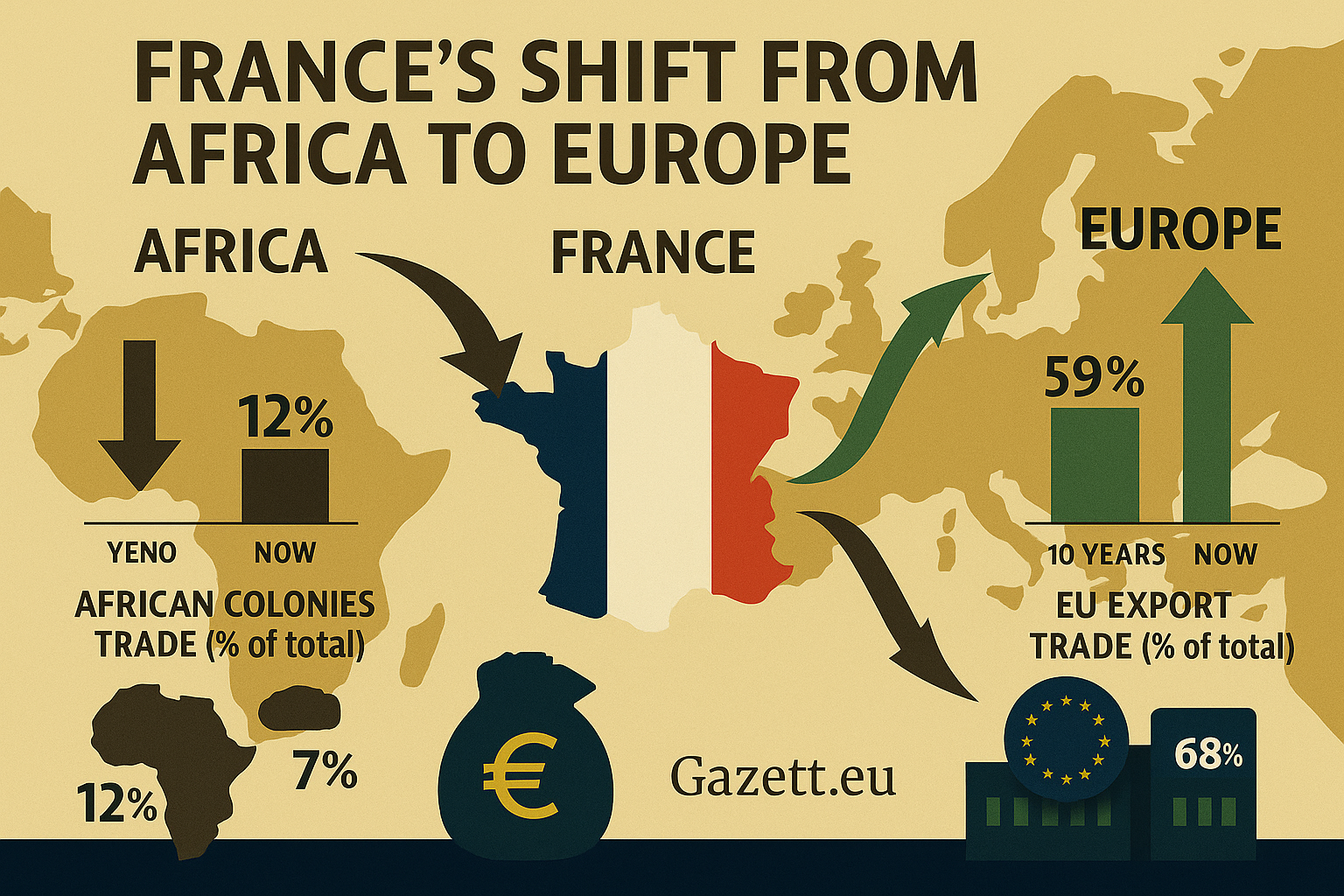
📚 Article Overview
- 🌍 Colonial Legacy and the Waning French Influence in Africa
- ⚔️ The Sahel Collapse: Russia, China, and New Power Brokers
- 🛡️ The Macron Doctrine: Redefining French Strategic Autonomy
- 🚢 Military Repositioning: Indo-Pacific, Eastern Europe & Beyond
- 🏭 Strengthening Europe's Defense Industrial Base
- 🔮 Future Outlook: France’s Global Role in a Multipolar World
- ✅ Conclusion + Summary Table
🌍 Colonial Legacy and the Waning French Influence in Africa
For decades after the end of formal colonial rule, France maintained significant influence over its former African territories through a mix of military presence, political ties, and economic interdependence. This policy, often referred to as “Françafrique”, allowed Paris to act as a de facto power broker in West and Central Africa.
But in the 2020s, this grip began to erode. A wave of military coups across the Sahel—particularly in Mali, Burkina Faso, and Niger—combined with rising anti-French sentiment and the growing assertiveness of local leadership, has led to a full-scale collapse of France’s regional dominance.
Public opinion in several African capitals has increasingly equated French military interventions with neocolonial overreach. Meanwhile, security partnerships have weakened and new alliances—especially with Russia (Wagner) and China—have started to take root.
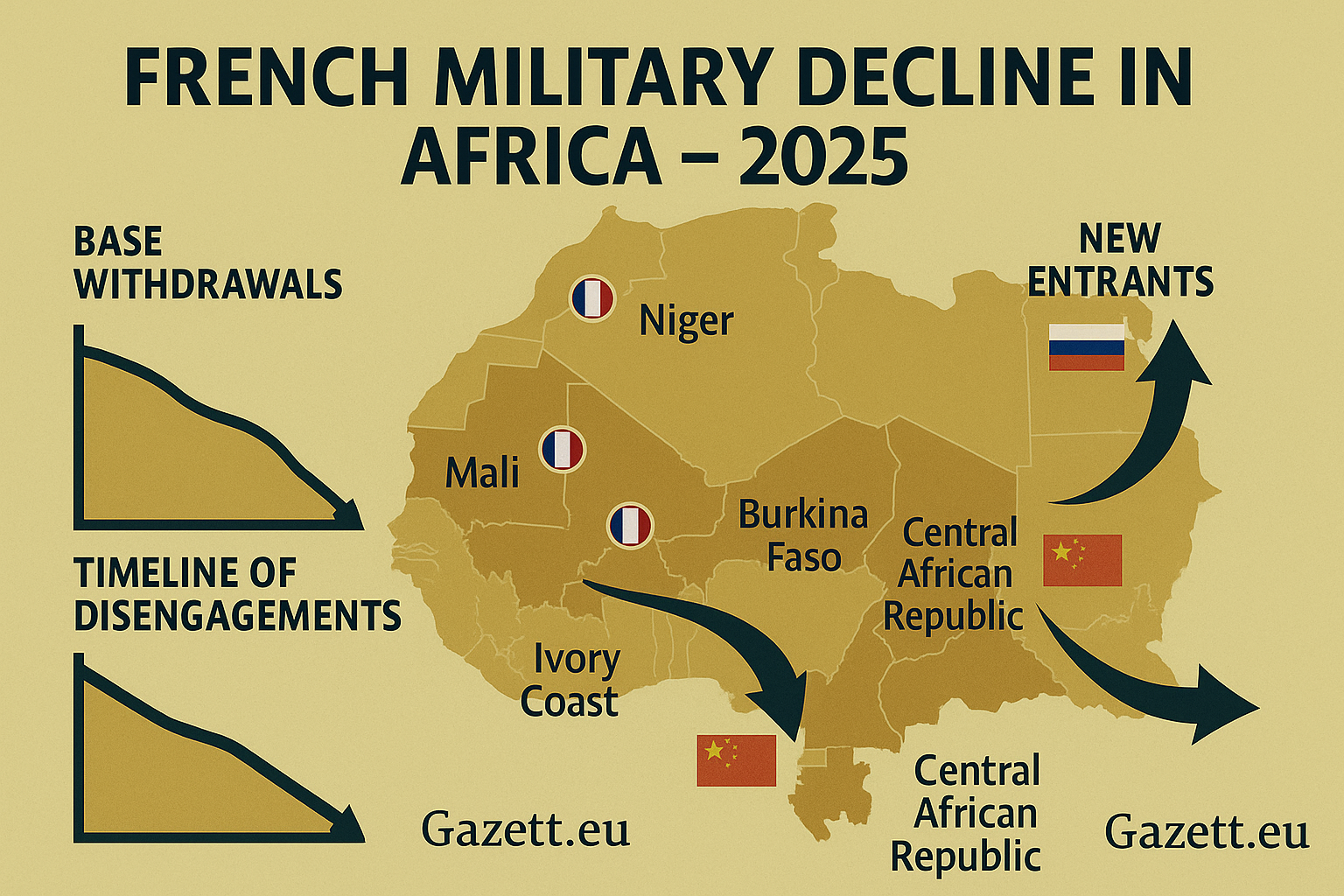
Internal Source: Gazett.eu | Related: EU–Sahel Relations Reshaped
⚔️ The Sahel Collapse: Russia, China, and New Power Brokers
The Sahel has become ground zero for a seismic geopolitical shift. As France retreats militarily and politically from the region, a new lineup of foreign actors is filling the vacuum. Russia, through the Wagner Group and military advisers, has rapidly expanded influence in Mali, Burkina Faso, and Niger — offering security guarantees and arms in exchange for mineral access and political loyalty.
China, on the other hand, has moved in via economic channels. Infrastructure projects, digital surveillance systems, and mining contracts are now increasingly sourced from Beijing-backed firms. This multipolar realignment in the Sahel is weakening Western coordination and complicating EU strategic interests in West Africa.
What was once France’s exclusive sphere of influence is now a fragmented zone of contested authority — with local militaries, paramilitary forces, and foreign mercenaries reshaping the power calculus. The collapse of Western influence in the Sahel is not just regional — it has global implications for migration, energy, terrorism, and mineral supply chains.
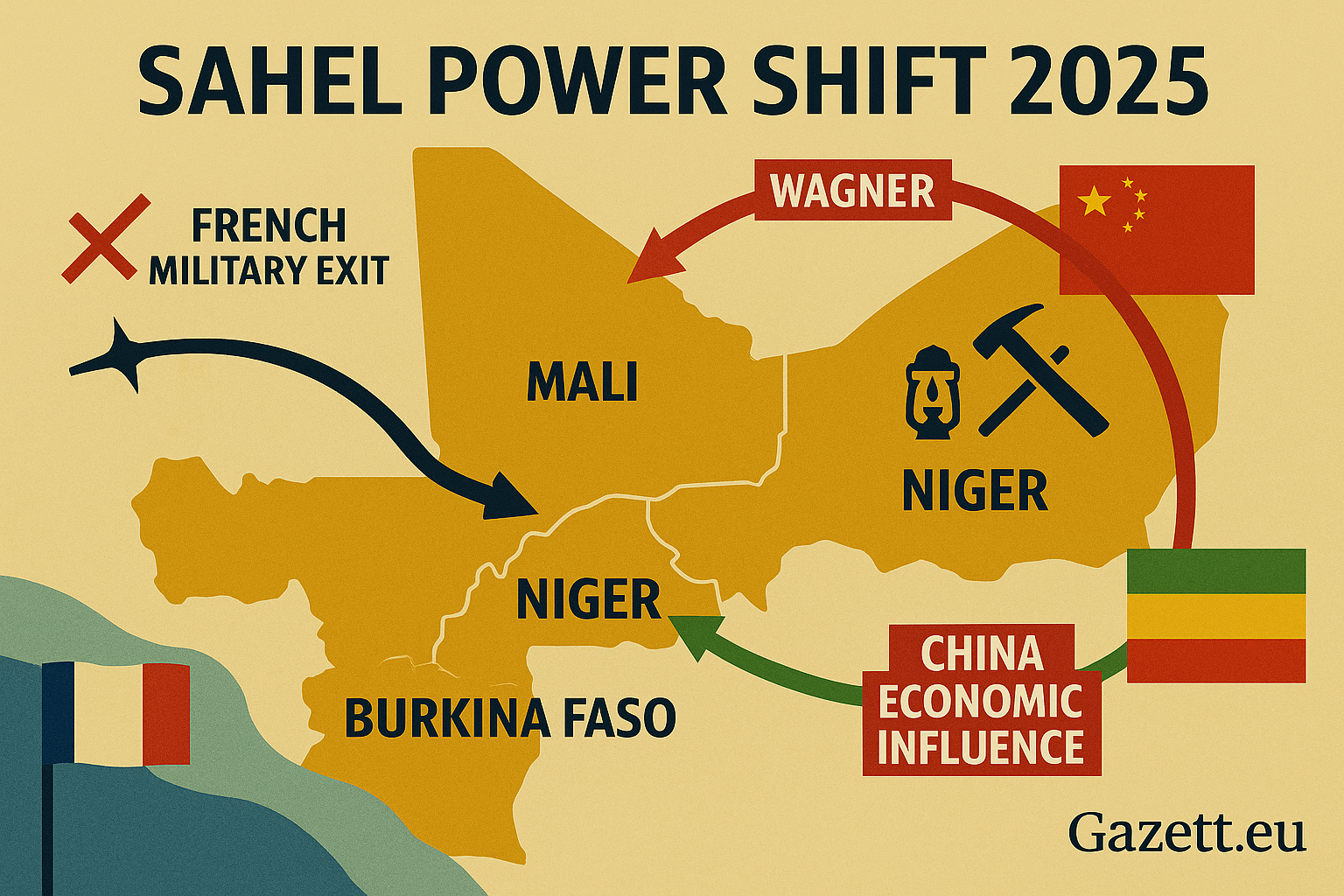
Internal Source: Gazett.eu | Related: Russia–Africa Ties Deepen
🛡️ The Macron Doctrine: Redefining French Strategic Autonomy
In the wake of diminished influence in Africa and growing dependency concerns within NATO, French President Emmanuel Macron has unveiled a bold shift in foreign policy thinking — a doctrine of “Strategic Autonomy” that seeks to reposition France not as a subordinate power within blocs, but as a fully sovereign actor in global affairs.
This doctrine emphasizes European defense sovereignty, energy independence, and technological leadership. Macron has repeatedly stated that Europe cannot remain “a vassal” in the emerging U.S.–China superpower rivalry. France’s withdrawal from volatile regions is not retreat — it’s a redirection of strategic bandwidth towards Indo-Pacific partnerships, Eastern Europe deterrence, and a renewed EU pillar in NATO.
Macron’s pivot also includes more assertive diplomacy at the UN, BRICS+ dialogues, and in tech regulation platforms — all aimed at positioning France as the spearhead of an autonomous European geopolitical identity.
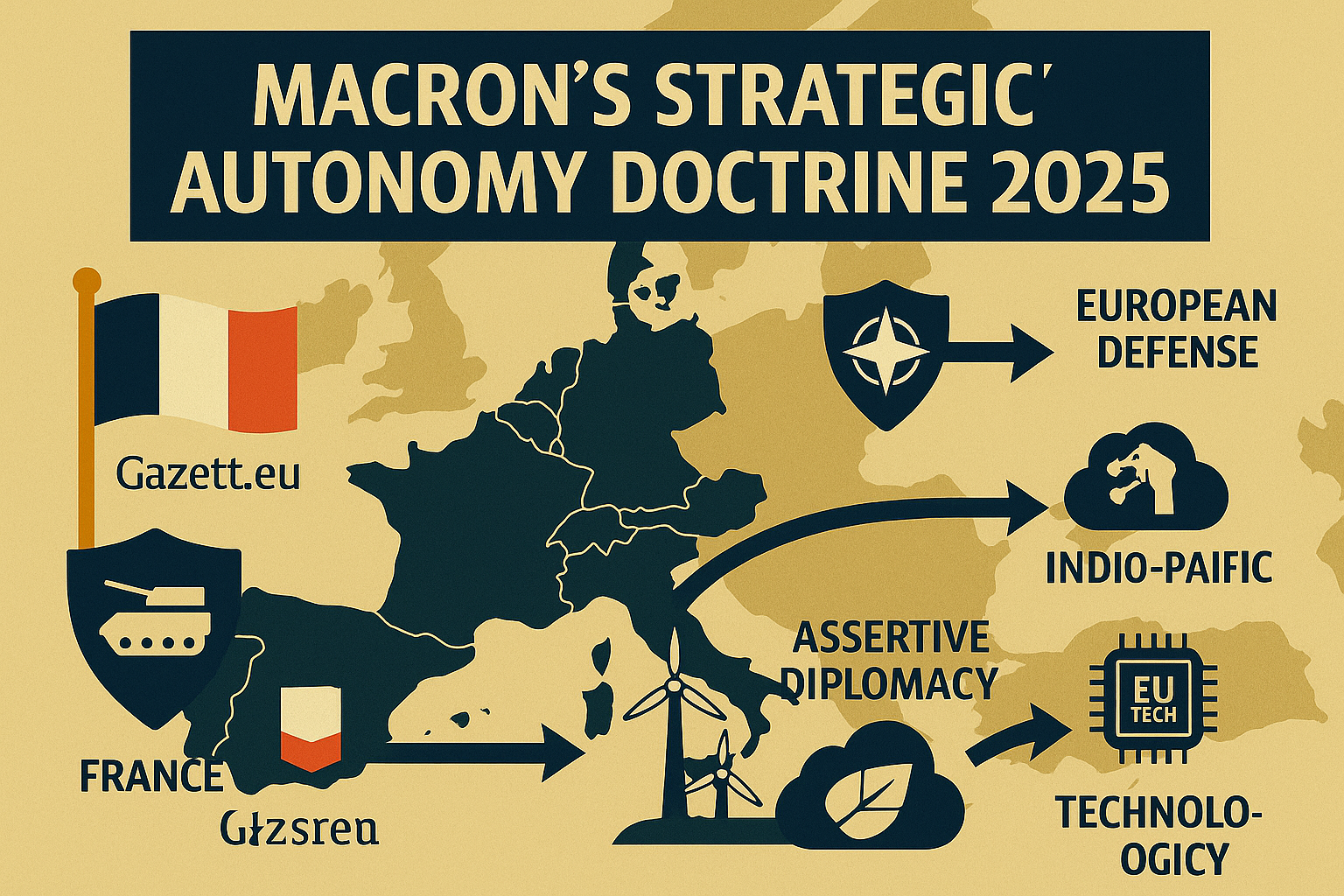
Internal Source: Gazett.eu | Related: Strategic Autonomy in European Defense
🚢 Military Repositioning: Indo-Pacific, Eastern Europe & Beyond
France’s withdrawal from key African bases has not meant demilitarization — it has marked a strategic realignment. French military assets are now increasingly repositioned to deterrence zones relevant to NATO, EU resilience, and Indo-Pacific partnerships.
In the Indo-Pacific, France has increased its presence in the Indian Ocean, New Caledonia, and French Polynesia, aligning with Quad+ partners to ensure maritime security and open sea lanes. In Eastern Europe, French troops are now embedded in forward NATO deployments in Romania, Poland, and the Baltics, reinforcing deterrence near the Russian frontier.
France’s doctrine of “Strategic Depth” also extends to cyber-defense and space operations — with new military cyber units being deployed across European theaters, and a focus on interoperability with EU defense tech platforms.
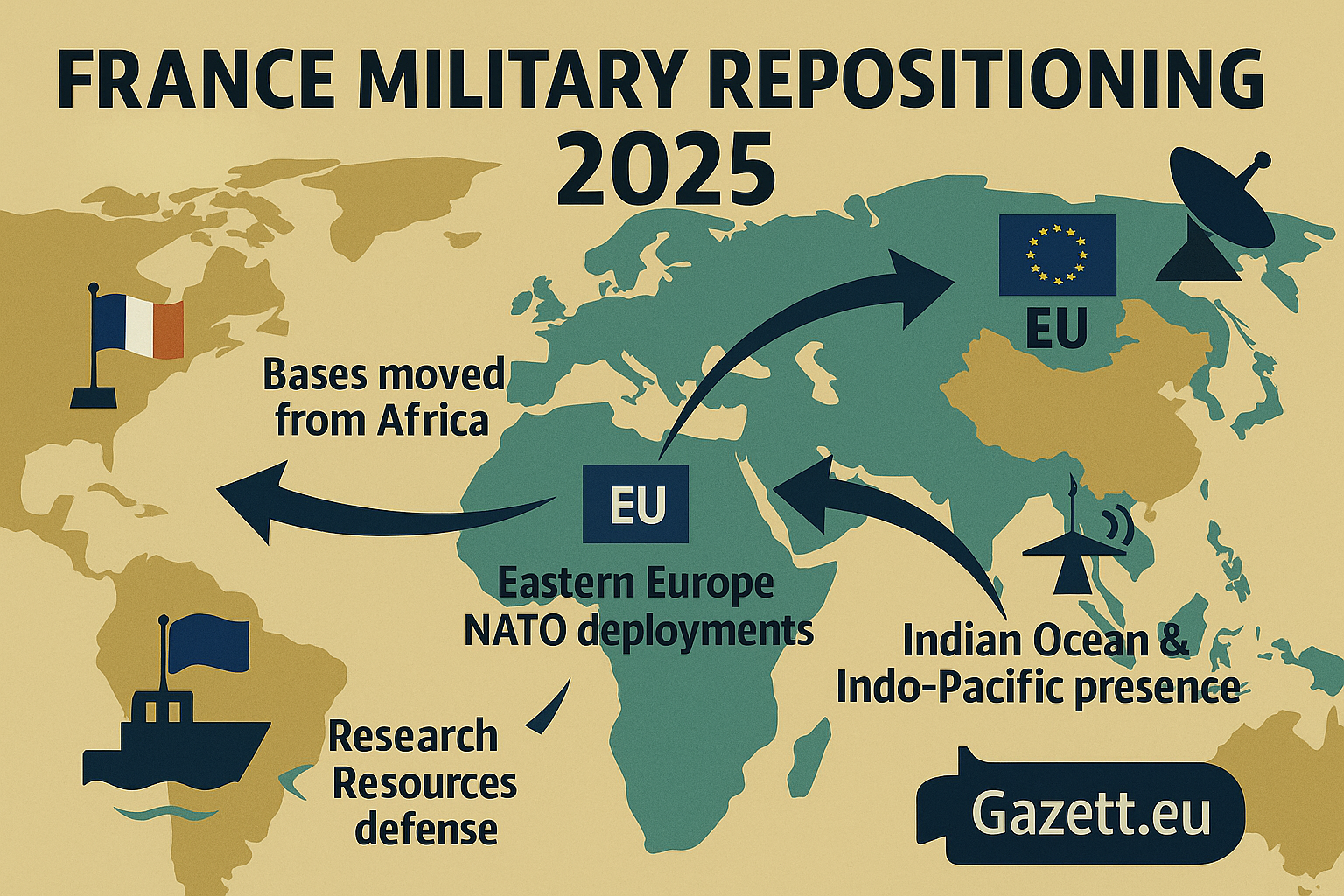
Internal Source: Gazett.eu | Related: French Military Realignment in Global Theaters
🔮 Future Outlook: France’s Global Role in a Multipolar World
By 2025, France is recalibrating its foreign and security policy to assert itself as a leading strategic actor in a multipolar world. The retreat from Africa is not a sign of decline but a pivot — toward European consolidation, Indo-Pacific reach, and institutional influence through regulation, finance, and diplomacy.
Paris is deepening alignment with Germany on EU security doctrine, while carving out a unique foreign policy profile through energy diplomacy, arms exports, and digital regulation. This positions France as a connective power between Europe, the Global South, and transatlantic allies.
The long-term roadmap includes revamping France’s diplomatic corps for tech fluency, climate negotiations, and economic statecraft — and reimagining soft power via education, culture, and space diplomacy.

Internal Source: Gazett.eu | Related: France’s Tech Diplomacy in Indo-Pacific
✅ Conclusion: France’s Strategic Reset Is Europe’s Test
France’s pivot from its historic African dominance to a more EU-focused strategic doctrine reflects a broader evolution in Europe’s geopolitical role. As French troops withdraw and soft power recalibrates, Paris is doubling down on defense production, cyber alignment, Indo-Pacific security, and global diplomacy.
The key challenge for France is maintaining credibility—balancing influence without overextension, and building coalitions without historical baggage. Whether through industrial hubs in Poland, naval deployments in the Pacific, or digital sovereignty within the EU, France is signaling a more modernized, multifaceted form of global engagement.
| Strategic Theme | 2025 Direction |
|---|---|
| Africa Policy | Rapid military withdrawal, waning diplomatic leverage |
| Sahel Influence | Displaced by Russia (Wagner) & China-backed investments |
| Macron Doctrine | EU-led strategic autonomy, Indo-Pacific & cyber shifts |
| Military Realignment | Bases shift to Romania, Djibouti, Indo-Pacific corridors |
| Defense Industry | France as EU arms hub, supporting common procurement |
| Global Influence | Soft power through tech, culture, diplomacy, climate policy |
External sources: CFR, The Economist, Bruegel, Defense News, EEAS